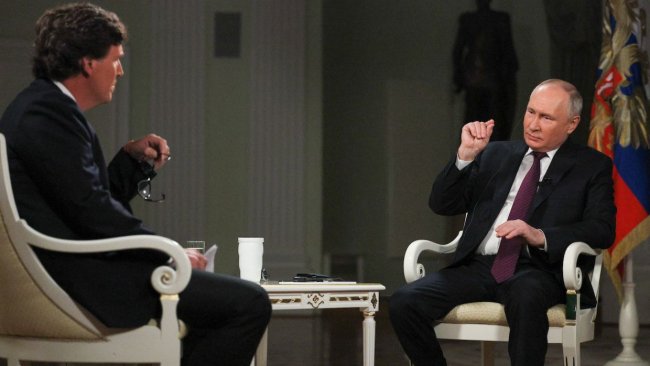President Vladimir Putin’s interview with American journalist Tucker Carson will be studied in Russian schools. The relevant materials are published on the portal for educational programs recommended by the Ministry of Education of Russia, reports The Moscow Times.
A recommendation to teachers prepared by the State Initiatives Support Agency called the two-hour interview a “significant educational resource” and recommended that it be used for “educational purposes” – in history lessons, social studies and “in the context of patriotic education”.
Teachers are encouraged to “lead class debates” in which students discuss the interview; to be involved in “research projects” related to the interview topics. “Analyze the interview as a media text” to “teach students to identify reliable sources of information,” the recommendation says.
It is recommended that Putin’s interview be used in history lessons for “analysis of contemporary international relations and their historical roots”. In social studies classes, it can be useful for “discussing civic responsibility and developing a critical view of contemporary political processes,” the memo said. It is also suggested to study the interview in literature (to “develop analytical skills”), geography (to “study the geopolitical situation of countries”) and even in foreign language and computer science classes (to “enrich vocabulary” and develop of “media literacy”).
“It is important for classroom teachers to read this interview because it can serve as a basis for discussions about the importance of civic responsibility and historical awareness,” write the authors of the material. They also point to the “educational potential of the interview”, which “consists in the ability to contribute to the formation of a civic position and national identity in students”.
When discussing the interview with children of participants in the war, teachers are advised to show “special attention to the emotional state of children”, not to limit them in expressing their feelings, and also to emphasize “the national support and unity of Russian society in this question”.
Putin’s interview was shown to Russian television viewers on the morning of February 9, but did not generate widespread interest.
With a rating of 2.9%, the interview took only 19th place in the list of the most popular TV programs for the week of February 4-11.
In the interview – the first to the Western press since the start of the war – Putin said Ukraine belonged to Russia’s “historic lands”, accused Austria of “policing” Ukraine before World War I and attributed the root causes of the February 2022 invasion to the era of Kievan Rus from the 9th century. He complained about Kiev’s refusal to implement the Minsk agreements and accused NATO of starting the “assimilation” of Ukrainian territory with the help of its “structures”.











